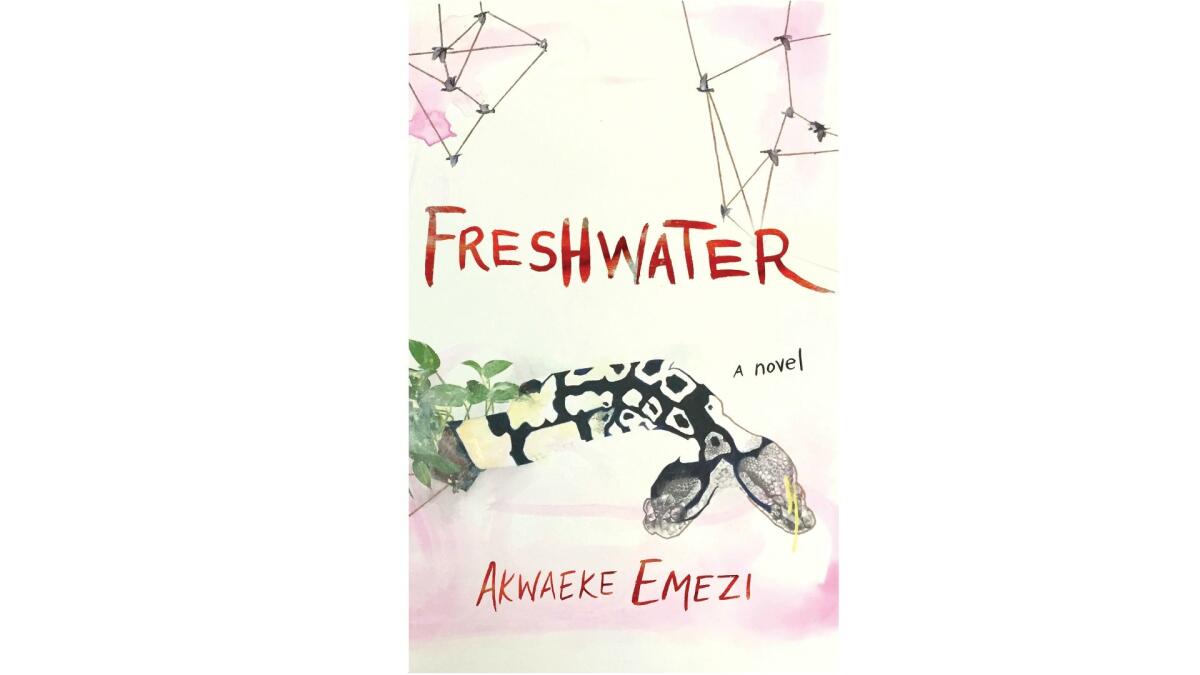A dazzling, devastating novel: ‘Freshwater’ by Akwaeke Emezi
- Share via
There is a devastating moment in “Freshwater,” the debut novel by Akwaeke Emezi, when the main character known as Ada gives herself over completely to the spirit that has implanted itself into her while she was in her mother’s womb. Asughara, as the girl names the being inside her, says this: “If you are a python’s child, then you are also a python — simple. There should have been a regular molting that came with that, but I was not regular. I wasn’t allowed some gentle and slow shrugging off of skin. No, my own was to tear it away as soon as I came through, splitting it into pieces that were never found, coming out damp with blood. This is what happens when you act as if a human can hold godmatter without it curdling.”
From the opening of the novel, this baby girl, born in southern Nigeria, middle child of a Nigerian man of the Igbo people and a Tamil mother born in Melaka, is the body as vessel for this spirit that revels in wicked manipulation, violence and pleasure as experienced through Ada. She is ogbanje. Many cultures recognize children who grow up with “one foot on the other side,” as the author says in her dedication. In Ojibwe, they are called “two spirit” people. In Navajo, nadleehi means one who is transformed. In Igbo religious teachings, the literal translation for ogbanje is “children come and go,” meaning that the malicious spirit will continue to inhabit a family unless the ogbanje child is mutilated so that the spirit will not desire to return to that particular body.
In a recent essay for the Cut, Emezi, who with her sister has a large international social media presence, details her own surgeries, her own painful process of stripping away the female — her breasts, her reproductive organs. The novel is based in many of the realities of the writer's life, but the prose is infused with imaginative lyricism and tone. In the end, this coming-of-age novel also has one foot on the other side, held between the open gates — a young woman of many nations and many souls.
The journey undertaken in the novel is swirling and vivid, vicious and painful, and rendered by Emezi in shards as sharp and glittering as those with which Ada cuts her forearms and thighs, in blood offering to Asughara. The prose here is startling and filtered through the spirits from the very start. “We came from somewhere — everything does. When the transition is made from spirit to flesh, the gates are meant to be closed….Perhaps the gods forgot; they can be absentminded like that…. By the time she (our body) struggled out into the world, slick and louder than a village of storms, the gates were left open. We should have been anchored in her by then, asleep inside her membranes and synched with her mind…. We were her and yet not.”
Ada’s parents struggle with her wildness, inconsolable and violent, and then after a terrible accident to her younger sister, and the sight of blood, the spirit inside their child demands blood always. As Ada grows, many gods converse inside her, fighting for her soul and comfort. Her parents take her to Catholic Mass, and the spirits inside observe Christ: “We knew him; we knew his name was Yshwa….It was, we also knew, impossible for him not to hear her. He hears every prayer babbled screamed sung at him….Yshwa too was born with spread gates, born with a prophesying tongue and hands he brought over from the other side…. he loves them as a god does, which is to say, with a taste for suffering.”
When Ada’s parents separate, and she leaves for college in America, the splintering of selves takes place in immensely painful scenes. For the next 12 years, the young woman makes constant sacrifice to the hungry gods inside her: “At twenty, when she was in veterinary school, after spending long hours separating skin from cadaver muscle and lifting delicate sheets of fascia, she would return to her room and use a fresh scalpel on her scarred left arm. Anything, you see, that would make that pale secret flesh sing that bright mother color.”
Ada scars her arms and thighs. The spirit inside her demands sex. But after sexual violence is visited upon her body by a fellow college student, an athlete, “Danish according to his passport, Eritrean according to his blood, a skinny boy with pools for eyes and dark spilling smooth on his skin,” Ada descends into the fracture of herself and names one spirit, Asughara, who dominates the rest of the novel.

In Emezi’s powerful telling, violence births Asughara, and Asughara controls life. Ada cuts off her thick, beautiful hair, even waxes off her eyebrows, and the spirit remarks that now the girl looks more like her: offspring of the python goddess Ala. Sculpting to skeletal her body, through little food and excessive exercise, Ada finds it is not enough for Asughara, who wants pleasure and sex and betrayal for herself. Asughara is the impulse and action — “the Ada,” as the spirit calls her, is the body — separate and obedient.
For the rest of the novel, as the fracturing deepens, and Ada’s life is in the balance, other holy figures debate her existence — Chango, Santa Marta, Yshwa and St. Vincent. Ada even marries, and Asughara destroys the marriage. Ada begins to date women, but the spirit dislikes this, and then, finally, after the death of someone beloved, Asughara tries to end Ada’s life. “Ada nodded and I kept the count for her. A few hundred milligrams down, several thousand, a few hundred more to go. She always hated taking tablets with water and she’d meant to make grapefruit juice earlier, but the juicer was dirty.” The painkillers are taking effect when a friend calls, and the plan is ruined. She is rescued.
Then the rest of the Igbo spirits take over, because Ala would never condone suicide. And Emezi’s narrative grows into a battle for the body of Ada: “Even all of that was nothing compared to the best things we’d accomplished, when we laid out the Ada’s body on a surgical table and let a masked man take a knife lavishly to the flesh of her chest, mutilating her better and deeper than we ever could, all the way to righteousness.”
But this is Ada’s power, for herself, as well. To survive the ogbanje means to change her very self. As the collective “we” of the spirits say, “When you break something, you must study the patter of the shattering before you can piece it back together. So it was with the Ada. She was a question wrapped up in breath: How do you survive when they place a god inside your body?” Emezi’s lyrical writing, her alliterative and symmetrical prose, explores the deep questions of otherness, of a single heart and soul hovering between, the gates open, fighting for peace.
Straight’s new story, “The Princess of Valencia,” will be released by Amazon Originals on Feb. 27. She’s on Instagram @susan.straight
Sign up for our Book Club newsletter
Get the latest news, events and more from the Los Angeles Times Book Club, and help us get L.A. reading and talking.
You may occasionally receive promotional content from the Los Angeles Times.







